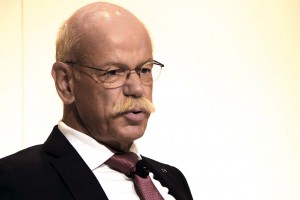
Daimler's Dieter Zetsche recently told shareholders that advanced technologies will help make Daimler a leader in the years ahead.
Daimler AG plans to embrace the new digital technology to help keep the 130-year old company relevant long into the future as it continues to evolve, according to the company’s chief executive officer.
Dieter Zetsche, Daimler AG CEO and the head Mercedes-Benz Cars, told the company’s shareholders during the company’s annual meeting in Berlin that while digitalization is changing the industry, it is also opening up new opportunities for companies, such as Daimler, that are willing to embrace them.
For several years now, Daimler has been developing from an automobile manufacturer into a mobility provider, he said and car2go, the company’s car-sharing subsidiary, is the world’s leading car-sharing company with approximately 1.2 million customers.
In addition, the “mytaxi” app is used in 40 European cities. In Germany and Spain, mytaxi is partnered with Google Maps, so that the duration and price of a taxi journey can be shown. Users can find the fastest way of traveling between two places with the inclusion of all means of transport.
Daimler also generates additional growth in the sector of long-distance bus transport and with its interest in Mein Fernbus Flixbus. In 2015, 20 million passengers used long-distance buses; more than half of which are from Daimler Buses.
Zetsche said one precondition for Daimler’s long-term success is the company’s fundamental attitude. The attitude is reflected by the new management approach that will review the company’s operations from top to bottom in the next few years.
(Mercedes hit with class-action lawsuit over diesels. For more, Click Here.)
“Our hierarchical structure, our meeting culture and our methods of evaluating performance assessments – all of them will be closely examined. The only parameter for this process will be that there are no parameters,” he said.
The impetus out of the “Leadership 2020” project comes from a team of international employees from all departments and hierarchy levels, he added.
“Connectivity is the way to derive significant value added for our customers from this mountain of data,” emphasizes Zetsche. With the new E-Class, partially autonomous driving is already possible. It is the world’s first series-production car with car-to-X communication, that is, with the ability to communicate with other cars and with the infrastructure,” he said.
Connectivity is also required for the optimal control of goods transport, because worldwide transport volumes continue to increase and could triple by 2050.
(Click Here to see why Mercedes-Benz is expected to carry Daimler to profitability in 2016.)
Daimler is one of the world’s largest heavy truck makers and the connected truck can increase the efficiency of road freight transport enormously, Zetsche said. “Worn-out parts can be replaced earlier; loading capacity can be utilized more effectively; lost time, fuel consumption and emissions can be reduced, while improving safety. By 2020, Daimler Trucks will therefore invest approximately 500 million euros in the field of connectivity.
The car industry ought not back away from the use of big data mining. A study shows that the volume of data produced doubles every two years. Scientists predict that the data volume could amount to 40 trillion gigabytes by 2020 to enhance safety and movement will be necessary in the future.
Digitization in manufacturing will also enable companies to react more flexibly to customers’ individual wishes in the future, the degree of automation in production will be reduced to the ideal level. Against the backdrop of the multitude of models, versions and options available.
Daimler places priority on intelligent cooperation between robots and humans, managed by humans, and without the protective fences that have so far been come on. In this way, the cognitive superiority of humans can be optimally combined with the strength, endurance and reliability of robots, Zetsche noted.
(To see more about Daimler plowing $3 billion into diesel development, Click Here.)
“The experience, creativity and flexibility of human beings will continue to be irreplaceable in the production of automobiles,” Zetsche said.
